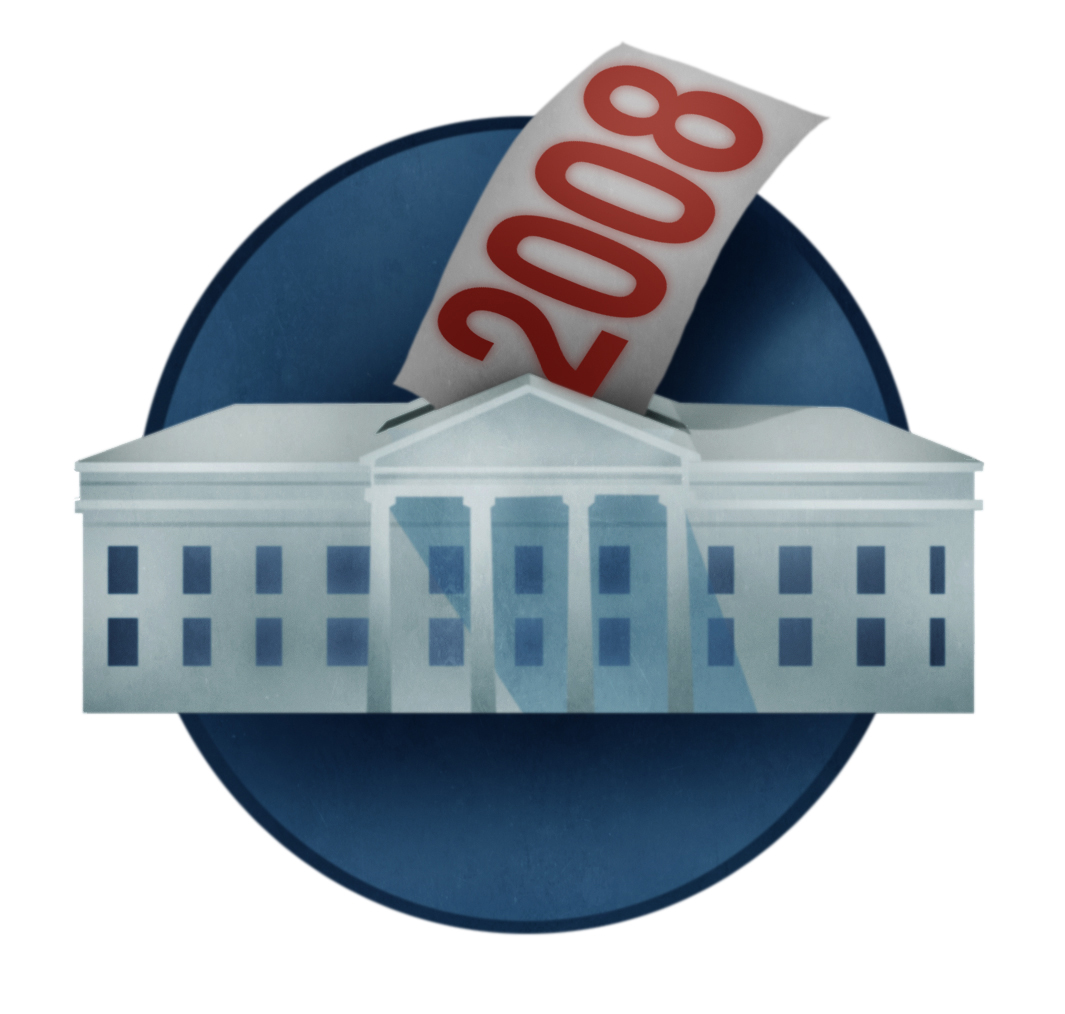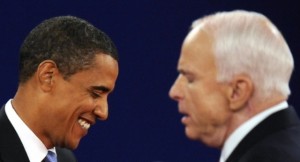The Final Throw-Down
In the final presidential debate in 1980, Ronald Reagan ensured his election by proving that he was a man the American people could feel safe with, a man whose actions wouldn’t send the world into a mass panic. Obama must do the same tonight against McCain if he wants to win the White House.
Jul 31, 20205.4K Shares304K Views
Image has not been found. URL: /wp-content/uploads/2008/10/debate-2.jpgSens. Barack Obama and John McCain set for tonight's final debate. (flickr)
Have we finally reached the end?
Much has changed since Sens. John McCain and Barack Obama debated last month in Mississippi — all of it for the worse, as far as the country and the economy are concerned. Now we have one more meeting, one more moment, with the old soldier, the self-proclaimed steady hand, facing off against the great avatar of hope, the man who has promised he can help this country rise above the ordinary into the extraordinary.
Now was supposed to be McCain’s moment to prove himself as the man with the experience to put things right. Yet it has been the young Democratic presidential nominee who has more than stood his ground.
Illustration by: Matt Mahurin
Faced with grave economic circumstances, it has been Obama, not McCain, who has come off as a “steady hand at the tiller,” the man who does not panic. With each passing day, as the economic crisis tightened its grip on the nation, it’s been Obama who has reflected an inner peace and a vision of how we might get out of perhaps the worst meltdown since the Great Depression.
With a calm reminiscent of Franklin D. Roosevelt, Obama has become that vision of hope when hope is most needed — and, in so doing, opened up as much as a 14 percentage point lead in the most recent New York Times/CBS News poll. In a matter of weeks, the neophyte has seemed, well, pretty damn presidential.
It’s rooted in the one thing his critics assailed him for — an ability to display calm and patience and what the political analysts like to call “coolness.”
“He’s done it by being cool and calm and having a lot of grace,” said Democratic strategist Bob Shrum, who spearheaded Sen. John Kerry’s 2004 presidential bid. “I always thought that idea [of him needing to show raw emotion] was a ridiculous construct. People like a person who, under crisis, has the ability to handle themselves. He’s very disciplined. He has a strategy, and he sticks to it.
“He’s also fortunate to have run against two campaigns,” Shrum continued, “first against Hillary Clinton, in the primaries, and John McCain now, who were guided by a complete misdiagnosis. They both ran on this idea of experience. And I don’t think it occurred to anybody that the last three times people used experience as their major theme — [Richard] Nixon against [John] Kennedy, [Ronald] Reagan against [Jimmy] Carter and [Bill] Clinton against George H.W. Bush — the supposed inexperienced candidate won.”
So far, that game plan has been followed. Obama’s managed not to be rattled while striking back at McCain attacks without seeming petty. While McCain has worn his frustration, even his dislike, of Obama on his face, the 47-year-old contender has managed to do the opposite. Strategically perfect, in the last debate he ran off a litany of McCain foreign-policy gaffes while his elder opponent — who thought he was about to get a compliment — looked on in horror.
Yet there is no underestimating the importance of this final throw-down. Given the volatility in the polls, tonight’s debate at Long Island’s Hofstra University represents Obama’s last, and perhaps toughest, test. Having by most accounts passed the “presidential threshold,” Obama has to keep that score, that image, in order to make sure he holds the momentum he’s gained through two debates.
As William Black, an Obama supporter and political director for the Michigan Teamsters, said two weeks ago, as we drank coffee in his basement office decorated with tributes to the late Jimmy Hoffa, “John McCain is a guy you can never count out.”
It is easy to forget McCain’s remarkable political guile. A year ago, he was a political dead man, out of money, with an operation held together by bubble gum and thumbtacks. Within months, he had leap-frogged his better-financed opponents, taken control of the race and reached the decisive victory he’d been seeking since bowing out to George W. Bush eight years before.
“Obama has to be careful,” said Tony Coelho, the former House majority whip who served as general manager of Al Gore’s 2000 presidential campaign. “The race is his and, at this point, it’s still his to lose. But there could be a signal statement he makes, or McCain makes, that becomes the identifier of this campaign. It could be some comment that rings true with people and is repeated with each headline. I think he has to be sharp enough to not make that mistake. The McCain people are going to be looking for that opportunity, and he needs to be able to come back if something like that happens.
“He doesn’t need to too much,” Coelho said. “He needs to continue to have people identify with his calmness, and not have McCain rattle him. If he does that, he’s going to win.”
In many ways, the debate represents a closing moment for Obama–a final opportunity to bring order to what has been a long, chaotic struggle.
But the question remains: Is he capable of a decisive strike — that moment where everyone can just say that’s it, fini?
After all, running against Sen. Hillary Clinton for the nomination, Obama didn’t as much knock out his opponent as outlast her. Yet when the final delegate tally was in, it was Obama who secured enough states to win the nomination.
“It’s pretty dull, but this is how Obama closes,” said Julian E. Zelizer, a professor of history and public affairs at Princeton University. “There’s no drama to his campaigning. He gets the lead and he holds it. What we saw during the primaries was his calmness, his coolness, the ability to run out the clock. And you’re seeing a very similar thing now.”
But more than a closing moment, the debate might be something more — Obama’s Reagan moment. During the months I’ve covered this campaign, Reagan has been the person persistently cited by folks from both parties when talking about Obama.
Like Reagan’s campaign in 1980, Obama’s effort has been conducted in a time of uncertainty abroad and economic despair at home. After besting Sen. Edward M. Kennedy in the Democratic primary, the campaign of President Carter, like McCain’s, squared solely on attacking Reagan.
Reagan, the California governor, was the former actor whose inexperience and hawkishness were viewed as capable of leading America into a nuclear exchange with the Soviets. He was untested on the national and international stage. He was a dangerous man unfit for a dangerous time.
Sound familiar?
A moment during the second debate. (flickr)
“Obama’s quite Reaganesque,” said Lou Cannon, a Reagan biographer. “People want to change parties — just as they did in 1980. They really do. The remarkable thing about McCain is that he’s been able to stick in it so long. Had it been any of the other Republican candidates, this thing would be long over. Obama, who many thought was a weak debater, has really become well practiced.”
In a recent poll, 86 percent thought America was off course. Back in 1980, many believed the same thing. The question was whether Reagan was the man to right it. And Reagan had one last debate — just days before Election Day — to answer the question.
Standing next to what seemed an increasingly diminutive Carter, Reagan seemed robust and optimistic, exuding a confidence and charm that one sees in Obama today. Following an awful opening, in which Carter spoke about turning to his young daughter, Amy, for foreign-policy advice, Reagan simply wore down the Georgian, remaining upbeat while Carter seemed flustered, even angry.
During the night’s most famous exchange, when Carter tried to assail Reagan’s assault on Medicare and Social Security as governor, Reagan simply said, “There you go again.”
Then in his closing, Reagan delivered the simple, yet powerful, line that political strategists and speechwriters have been desperately trying to recapture since its utterance. “Are you better off now,” Reagan asked, “than you were four years ago?”
It sealed the deal.
“Reagan was, of course, a good performer — but was a lot more substantive than people give him credit for,” said Ed Rollins, who worked on Reagan’s 1980 race and was national campaign director during his 1984 reelection win. “What Reagan did in that debate was reassure people. I’ve always said 1980 wasn’t necessarily about Reagan, but was about Carter.”
But what Reagan did, masterfully, was to show that he was a man the American people could feel safe with, a man whose actions wouldn’t send the world into a mass panic.
It was more than showing people that he was a man they would want to have a beer with. Reagan was the man who you could have a beer with but would make sure you got home alright. The American public was seeking a protector, and felt, with Reagan, that they found one.
“John McCain isn’t George Bush,” Rollins continued, “but [the Obama camapign has] done an effective job of painting Obama as an agent of change and they’ve very clearly tied McCain to Bush. It’s been Obama in the last month who’s shown himself to be the stronger, more stable leader.”
Perhaps tonight we won’t see the kind of blow Reagan delivered all those years ago. But what we should see is Obama at his apex — the man who calmly took control of the tiller from McCain, making it his ship to pilot for the campaign’s duration, before McCain even realized what was happening.
If Obama can withstand what is sure to be a litany of attacks over the next three weeks, and become the nation’s first African-American president, what we will remember is a vision of certitude in a deeply uncertain time. It will be Obama’s sense of command, his coolness, that will carry the day.

Hajra Shannon
Reviewer
Latest Articles
Popular Articles

